Wales national rugby union team
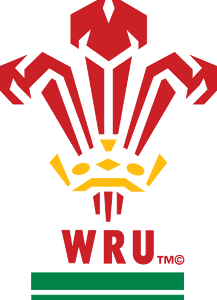 | |||
| Union | Welsh Rugby Union | ||
|---|---|---|---|
| Emblem(s) | The Prince of Wales's feathers | ||
| Ground(s) | Millennium Stadium, Cardiff | ||
| Coach(es) | Warren Gatland | ||
| Captain(s) | Sam Warburton | ||
| Most caps | Gethin Jenkins (114) | ||
| Top scorer | Neil Jenkins (1,049) | ||
| Most tries | Shane Williams (58) | ||
| |||
| First international | |||
|
(19 February 1881) | |||
| Largest win | |||
|
(26 November 2004) | |||
| Largest defeat | |||
|
(27 June 1998) | |||
| World Cup | |||
| Appearances | 7/7 (First in 1987) | ||
| Best result | Third, 1987 | ||
The Wales national rugby union team (Welsh: Tîm rygbi'r undeb cenedlaethol Cymru) represent Wales in international rugby union. They compete annually in the Six Nations Championship with England, France, Ireland, Italy and Scotland. Wales have won the Six Nations and its predecessors 26 times outright, joint-first with England. Wales' most recent championship win came in 2013. They also compete in the Rugby World Cup every four years. The International Rugby Board (IRB) regards Wales as a Tier One rugby nation.
The governing body, the Welsh Rugby Union (WRU), was established in 1881, the same year that Wales played their first international against England. Wales' performances in the Home Nations Championship (now the Six Nations) continued to improve, experiencing their first 'golden age' between 1900 and 1911. They first played New Zealand, known as the All Blacks, in 1905, when they defeated them 3–0 in a famous match at Cardiff Arms Park. Welsh rugby struggled between the first and second World Wars, but experienced a second 'golden age' between 1969 and 1980 when they won eight Five Nations Championships.
They played in the inaugural Rugby World Cup in 1987 where they achieved their best ever result of third. Following the professionalisation of rugby in 1995, Wales hosted the 1999 World Cup and, in 2005, won their first-ever Six Nations Grand Slam. That was the first Grand Slam won by a team playing most of the matches away from home. Wales won two two more Grand Slams in 2008 and in 2012, and in 2011 came fourth in the Rugby World Cup.
Their home ground is the Millennium Stadium, completed in 1999 to replace the National Stadium at Cardiff Arms Park. Eight former Welsh players have been inducted into the World Rugby Hall of Fame, and ten into the International Rugby Hall of Fame.
History
Early years (1881–1892)
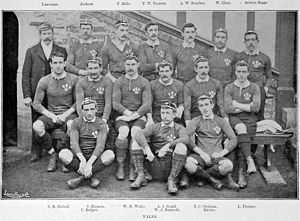
Rugby union took root in Wales in 1850, when Reverend Rowland Williams became Vice-Principal at St David's College, Lampeter, where he introduced the sport.[1] The first Welsh club, Neath was formed in 1871. Wales played their first international on 19 February 1881; organised by Newport's Richard Mullock, Wales played against England, losing by seven goals, one drop goal and six tries to nil (8–0). On 12 March 1881, the Welsh Rugby Union was formed at The Castle Hotel, Neath.[2] Two years later, the Home Nation Championship – now the Six Nations Championship – was first played and Wales did not register a win.[3][4][5] However, rugby in Wales developed and, by the 1890s, the Welsh had developed the four three-quarters formation. This formation – with seven backs and eight forwards, instead of six backs and nine forwards – revolutionised the sport and was eventually adopted almost universally at international and club level.[6]
First 'golden age' (1893–1913)
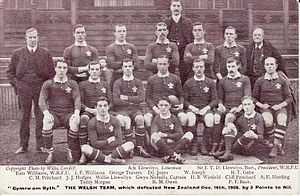
With the "four three-quarter" formation Wales became Home International Champions for the first time in 1893; in the process winning the Triple Crown.[6] Wales next won the Championship in 1900, heralding the first 'golden age' of Welsh rugby which was to last until 1911.[7] They won two more Triple Crowns in 1902 and 1905,[8] and were runners up in 1901, 1903 and 1904.[5]
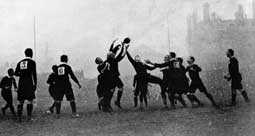
When Wales faced New Zealand's All Blacks at Cardiff Arms Park in late 1905 they had not lost at home since 1899.[9] This New Zealand team – now referred to as the Original All Blacks – was the first of the southern hemisphere national team to visit the British Isles,[10] and were undefeated on their tour up until that point; their victories included defeats of England, Ireland and Scotland in three Tests before facing Wales.[11][lower-alpha 1] Before the match, the All Blacks performed the haka (a Māori posture dance); the 47,000-strong crowd responded with the Welsh national anthem – Hen Wlad Fy Nhadau ("Land of Our Fathers") – the first time a national anthem had been sung before a sporting fixture.[12] Wales' winger Teddy Morgan scored first to give Wales a 3–0 lead, but later in the match All Black Bob Deans claimed to have scored a try, only to be dragged behind the line before the referee could arrive. The referee ruled a scrum to Wales and the score did not change; Wales winning 3–0.[13][14] The loss was the All Blacks' only loss on their 35-match tour.[15]
In 1906, Wales again won the Home Championship,[8][lower-alpha 2] and later that year playing the South African national side, the Springboks for the first time. Wales were expected to defeat the South Africans,[16] but instead South Africa dominated in the forwards and eventually won 11–0.[17][18] Two years later, on 12 December 1908, Wales played their first match against Australia's national side, the Wallabies, defeating them 9–6.[19]
In 1909, Wales won the Home Championship and then, in 1910 – with the inclusion of France – the first-ever Five Nations. In 1911, Wales took the first Five Nations Grand Slam by winning all their matches in the Five Nations;[8][lower-alpha 3]France were heavily defeated by Wales at St Helens in 1910 (49–14) and Ivor Morgan scored two tries in the match. It would be nearly forty years before they achieved a Grand Slam again.[8] England's defeat of Wales at Cardiff in 1913 was Wales' first home loss to one of the Home Nations since 1899, and their first home loss to England since 1895.[20] The Great War came in 1914 and rugby was suspended for the duration.
Post-war years (1920–1968)
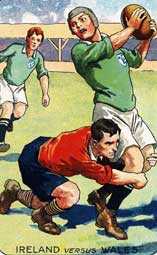
The post-First World War years marked a decline in Welsh rugby. An industrial recession struck the principality, and hurt South Wales in particular. Welsh international results in the 1920s mirrored the performance of the economy: of their 42 matches they won only 17, with three drawn.[21] Half-a-million people emigrated from Wales to find work elsewhere during the depression;[22] this included many Welsh rugby union internationals who moved to the professional code of rugby league.[23] Between 1923 and 1928, Wales managed only seven victories – five of them against France. However, even France managed to defeat Wales that decade; achieving their first victory over Wales in 1928.[24] Welsh selection policy reflected the upheavals of the mid-1920s. In 1924, 35 different players were selected for Wales' four matches, with a different captain for each; and only Edward Watkins in the backs and Charlie Pugh in the forwards, playing in all four matches.[21]
A resurgence of both economy and rugby union followed in the 1930s and, in 1931, Wales won their first championship for nine years. That year, for the first time since the First World War, Wales retained the same side for two consecutive Tests when they faced England and Scotland.[25] Then, in 1933, captained by Watcyn Thomas, Wales defeated England at Twickenham.[26] In 1935, Wales beat the touring All Blacks by 13–12, with Haydn Tanner making his first appearance. Although the Five Nations Championship was suspended during the Second World War[lower-alpha 4] Wales did play a Red Cross charity match against England at Cardiff in 1940, which Wales lost 18–9.[28]
Following the Second World War, Wales played a New Zealand Army team (the Kiwis) in 1946, which Wales lost 11–3.[29] The Five Nations (suspended during the war) resumed in 1947 when Wales shared the title with England. Although Wales suffered their first home defeat to France in 1948,[30] they won their first Five Nations Grand Slam since 1911 in 1950.[8] The next year, they lost to the touring South Africans 6–3 despite dominating in the line-outs.[31] They achieved another Grand Slam in 1952,[8] followed by a 13–8 win over the All Blacks in 1953.[32] In 1954, St Helens in Swansea (a Welsh international venue since 1882) hosted its last international and Cardiff Arms Park officially became the home of the Welsh team.[33] In 1956, Wales again won the Five Nations, but they did not regain the title until 1964 and did not win it outright until 1965.[8]
Wales conducted their first overseas tour in 1964, playing several games and one Test in South Africa.[34] They lost the Test against South Africa in Durban 24–3, their biggest defeat in 40 years.[35] At the WRU annual general meeting that year, the outgoing WRU President D. Ewart Davies declared that "it was evident from the experience of the South African Tour that a much more positive attitude to the game was required in Wales ... Players must be prepared to learn, and indeed re-learn, to the absolute point of mastery, the basic principles of Rugby Union football".[34] This started the coaching revolution. The WRU Coaching Committee – set up in the late 1950s – was given the task of improving the quality of coaching and, in January 1967, Ray Williams was appointed Coaching Organiser.[36] The first national coach, David Nash, was appointed in 1967 to coach Wales for the season, but resigned when the WRU refused to allow him to accompany Wales on their 1968 tour of Argentina.[37] Eventually, the WRU reversed their decision, appointing Clive Rowlands to tour as coach. Of the six matches, Wales won three, drew two and lost one.[38]
Second 'golden age' (1969–1979)
The Welsh team of 1969–79 were and still are considered to be one of the greatest rugby teams of all time. With world-class players such as Gareth Edwards, J.P.R. Williams, Gerald Davies, Barry John, and Mervyn Davies, Wales would, over the next decade, dominate Northern Hemisphere rugby, and attain an incredible winning record, losing only five times in the Five Nations Championship. When Wales defeated England in the 1969 Five Nations to win the Triple Crown and the championship, it ushered in the second 'golden age'. Wales toured New Zealand for the first time that year, but were defeated in both Tests. As well as losing the first Test 19–0, and the second 33–12,[39] they also conceded 24 points to the All Blacks' fullback Fergie McCormick in the second Test; a record at the time.[40]
In 1970, Wales shared the Five Nations with France, and recorded a 6–6 draw against South Africa in Cardiff.[41] In 1971, Wales recorded their first Five Nations Grand Slam since 1952. Using only 16 players in four games, the 1971 side is considered one of the greatest in Welsh rugby history.[42][43] Their most notable victory of the tournament was their victory over Scotland.[44] After a last minute try by Gerald Davies to reduce Scotland's lead to 18–17, flanker John Taylor kicked a conversion from the sideline described as "the greatest conversion since St Paul" to give Wales a 19–18 win.[43] Wales contributed more players than any other team to the British and Irish Lions that toured New Zealand that year. Those Lions became the only to win a series over the All Blacks.[45]
In the 1972 Five Nations Championship, Wales and Scotland refused to travel to Dublin at the height of the Troubles after receiving threats, purportedly from the IRA.[46] The Championship remained unresolved with Wales and Ireland unbeaten. Although the Five Nations was a five way tie in 1973, the Welsh did defeat Australia 24–0 in Cardiff.[47]
Wales next won the Five Nations outright in 1975, after sharing it with the four other countries in 1973. In 1976, Wales won their second Grand slam of the decade. Just like the first in 1971, they only used 16 players over their four matches. They repeated the feat in 1978 and, in the process, became the first team to win three consecutive Triple Crowns. Following their final Five Nations match of 1978, both Phil Bennett and Gareth Edwards retired from rugby.[43] Later that year, Wales played the All Blacks at Cardiff Arms Park, losing 13–12 after a late penalty goal by the replacement All Black fullback, Brian McKechnie.[48] The penalty was controversial because All Black lock Andy Haden had dived out of a line-out in an attempt to earn a penalty. Haden admitted in November 1989 – on the eve of that year's Wales match against New Zealand at Cardiff Arms Park – that he and Frank Oliver had pre-agreed this foul tactic should the All Blacks find themselves in difficulties. Although the incident looks obvious from the videotape (and referee Roger Quittenton was roasted by the press for failing to notice it), at the time the only journalist to comment was Clem Thomas. Visibility was not ideal but Quittenton later claimed (with mixed success) that he had actually given the penalty against Welsh lock Geoff Wheel for jumping off the shoulder of Frank Oliver. Whom one believes tends to reflect whom one supports though Welsh fans claim a moral victory that day. Haden later admitted that he was both surprised and delighted that his ploy worked.[49] The All Blacks went on to secure their first Home Nations Grand Slam.[50] Wales won the 1979 Five Nations with a Triple Crown. [51]
Barren years (1980–2003)
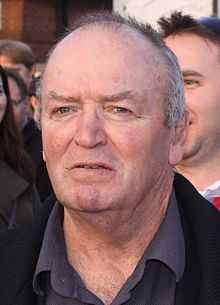
In 1980, the WRU's centenary year,[51] Wales lost to the All Blacks in Cardiff by 23–3 after the All Blacks scored four tries to nil.[52] Wales won two matches in each Five Nations championship between 1980 and 1986,[5] and in 1983 were nearly upset by Japan; winning 29–24 at Cardiff.[53] In 1984, Australia defeated Wales 28–9 at Cardiff Arms Park and in the process scored a push-over try. Australia went on to win their first Home Nations Grand Slam.[19]
Wales achieved only one win in 1987's Five Nations before contesting the first official Rugby World Cup. Wales defeated Ireland in their crucial pool fixture,[54] before defeating England in the quarter-finals.[55] They then faced hosts the All Blacks who won 49–6, but beat Australia in the third place play-off game to claim third.[56] The next year Wales won the Triple Crown for the first time since 1979, but heavy defeats on tour to New Zealand later that year saw the end of a number of Welsh players' careers, as many converted to rugby league.[51]
In 1990, Wales suffered their first Five Nations championship whitewash and, in 1991 narrowly avoided the same fate by earning one point for a draw with Ireland at Cardiff Arms Park. In the 1991 World Cup, Wales lost their first group phase game against Manu Samoa. They subsequently beat Argentina but lost heavily to eventual champions Australia and were thus knocked out prior to the quarter-finals.[57] After winning two Five Nations games in 1992, and one in 1993, Wales won the Championship in 1994 on points difference over England.[5]
In the 1995 World Cup, after beating Argentina 23–18, Wales comprehensively beat Japan and lost to New Zealand; this meant that they had to beat Ireland to make the quarter-finals. Wales lost 24–23 and so failed to progress beyond the pool stage for the second time,[58] and this resulted in Kevin Bowring becoming Wales' first full-time coach when he replaced Alex Evans later that year.[59]
Wales' performances improved with the appointment of New Zealander Graham Henry as coach in 1998 when he led them to ten-match winning streak; this included Wales' first ever victory over the then-world champions, South Africa, by 29–19.[60] Henry was consequently nicknamed "the great redeemer" by the Welsh media and fans.[61] Hosting the 1999 World Cup, Wales qualified for the quarter-finals for the first time since 1987, but lost 9–24 to eventual champions Australia.[62] Defeats to Argentina and Ireland in 2001 and 2002 led to Henry's resignation in February 2002; his assistant Steve Hansen took over.[60] Further defeats led to perhaps Wales' biggest ever shake-up in 2003. At the 2003 World Cup, Wales scored four tries in their 53–37 loss to New Zealand,[63] and also lost to the eventual tournament winners, England, in their quarter-final, despite outscoring them by three tries to one.[64]
Revival (2004–present)
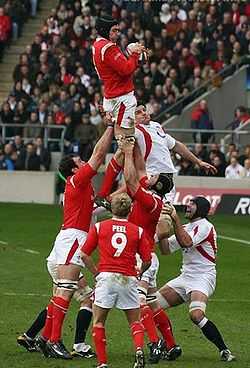
Coached by Mike Ruddock, Wales won their first Six Nations Grand Slam in 2005. They opened with an 11–9 win over England at the Millennium Stadium, thanks to a late long range penalty from Gavin Henson. After a 38–8 win over Italy, Wales faced France, and were losing 15–6 at half-time. Wales fought back in the second half to win 24–18, and the game was arguably one of the most exciting of that year's tournament. Wales beat Scotland away (46–22) and then, in front of a capacity crowd at the Millennium Stadium, played their final game against Ireland. Wales' 32–20 victory gave them their first championship title since 1994 and their first Grand Slam since 1978.[65] The 41–3 loss to the All Blacks at the Millennium Stadium later that year was their biggest loss on Welsh soil.[66] This was followed by a single-point win over Fiji, then a loss to South Africa, and lastly a win over Australia.[67]
On 14 February 2006, midway through the Six Nations, Mike Ruddock resigned as the head coach of Wales, for family reasons.[68] Scott Johnson took over as caretaker coach for the remaining games, and Wales eventually finished fifth in the 2006 Championship before Gareth Jenkins was appointed as head coach on 27 April.[69] On 10 May 2007, Wales and Australia decided to celebrate 100 years of Test rugby between the two countries with the establishment of the James Bevan Trophy.[70] It is named after the Australian-born Welsh-raised man who was Welsh team's first captain; Australia won the series 2–0.
The revival stuttered at the 2007 World Cup, as Wales failed to advance beyond the pool stage following a loss to Fiji.[71] Coach Gareth Jenkins subsequently lost his job,[72][73] and Warren Gatland, a New Zealander and former All Black, was appointed as Wales' new head coach on 9 November 2007. He had previously coached New Zealand province Waikato – leading them to success in the 2006 Air New Zealand Cup.[74] His inaugural match as coach was Wales' first match of the 2008 Six Nations Championship, against England at Twickenham. England were favourites and led by 13 points at half-time, before Wales fought back to win a 26–19 – their first at Twickenham since 1988. Wales went unbeaten throughout the tournament, and won their second Grand Slam in four Championships after defeating France 29–12 at the Millennium Stadium. Wales conceded only two tries in the entire tournament, halving the previous record of four tries conceded by England in both 2002 and 2003.[75]
In the 2008 end-of-year Tests Wales were defeated by both New Zealand and South Africa, but claimed wins over Canada and Australia. Wales' 21–18 victory made them the only Northern Hemisphere nation to defeat a Tri-Nations country in 2008, and sent them up to fifth in the world rankings and later fourth. Wales failed to retain their Six Nations Championship in 2009 after losing 17–15 to Ireland on the last day. The defeat gave Ireland the Grand Slam, and left Wales fourth on points difference despite their three wins.
At the 2011 World Cup, Wales defeated Fiji, Namibia and Samoa, only narrowly losing to South Africa at the pool stages. In the quarterfinals, they faced Ireland, beating them 22–10, hence reaching the semi-finals for the first time since 1987. It was at the semi-final stage that Wales came up short by the narrowest of margins, losing 9–8 to France after a red card for captain Sam Warburton in the 18th minute.[76]
On 17 March 2012, Wales completed their third Six Nations Grand Slam in eight years, with a 16–9 victory over France at the Millennium Stadium in the 2012 Six Nations Championship.[77] The victory over France was seen, by many, as the ultimate revenge for their narrow world cup semi-final defeat.[78] After the 2012 Grand Slam Wales suffered 8 consecutive defeats (4 versus Australia), including a record run of 5 home defeats. The losing streak was broken in round 2 of the 2013 Six Nations Championship with Wales beating France 16–6 in Paris. On 9 March 2013 versus Scotland, Wales achieved a record fifth consecutive away win in the Six Nations. Wales retained the Six Nations Championship after beating England in their final match by a record winning margin 30–3.[79] This was the first time Wales had retained the Championship since their 1978/1979 championship wins.
Strip
Wales play in red jerseys embroidered with the Prince of Wales's feathers, red shorts and red socks. Their change strip[lower-alpha 5] – also known as alternative strip – is grey jerseys, shorts and socks although there have been various different coloured strips in the past.[80] Former change strips worn by Wales have included a green or white jersey.[81] Since the 2008 end-of-year Tests, the strip is made by Under Armour. They replaced Reebok who supplied the Wales strip between late 1996 and the 2008 mid-year-Tests.[82] The shirt sponsor is Cardiff based Insurance firm, Admiral.[83][lower-alpha 6]
The Prince of Wales' feathers were chosen in the 19th century by the WRU over another Welsh symbol, the leek, to demonstrate the nation's loyalty to Britain.[85] In 1991, to enable the device to be trademarked, the original generic motif was replaced with a more stylised version. The original motto beneath the feathers was Ich dien (German for "I serve") but was replaced with WRU in the new version.[86] Wales wore black jerseys as part of celebrations for the WRU's 125th anniversary in 2005. The jersey was worn against Fiji and then Australia that year; the Australia match was the first time Wales had not played in their red jersey against one of their traditional rivals.[81]
Support
Rugby union and Wales' national team hold an important place in Welsh culture and society. Sport historian John Bale has stated that "rugby is characteristically Welsh", and David Andrew said that "To the popular consciousness, rugby is as Welsh as coal mining, male voice choirs, 'How Green Was My Valley,' Dylan Thomas, and Tom Jones".[87] Welsh rugby's first 'golden age' (1900–1911) coincided with the country's zenith during the 20th century,[88] and rugby was important in building Wales' modern identity.[89]
The 2004–05 season saw record attendances for Welsh home internationals.[90] For Wales' 2005 Six Nations match against Scotland in Edinburgh, 40,000 Welsh fans travelled to see the game.[91] The home attendance record was bettered the next year when over 500,000 fans attended Wales' seven home matches.[92] The Millennium Stadium regularly sells out all of its 74,500 seats.
Grounds
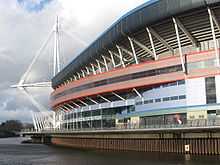
Wales' first home international was played at St Helen's ground, Swansea in 1882.[93] In the 1880s and 1890s, home Welsh internationals were played at Cardiff, Swansea, Newport and Llanelli.[94] Swansea continued to be used as an international venue until 1954, when Cardiff Arms Park became Wales' primary home venue.[95][96] Cardiff Arms Park first had a stand erected in 1881, and continued to expand its seating that decade.[97] Crowds continued to grow and in 1902 in Wales' match against Scotland a world record 40,000 spectators paid to see the match.[98] In 1911, the owners of the Arms Park, the Marquess of Bute's family,[99] confirmed Wales' tenure and the 1920s and 1930s, Wales gradually gained increasing control.[100] A new stand was built at the park in the 1933–34 season, which increased the grounds capacity to 56,000.[101]
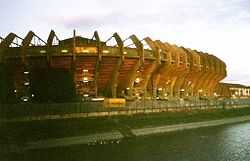
By 1958, the WRU had concluded that a new national ground was needed due to flooding that often plagued Arms Park.[102] After debate and disputes between the WRU and various other parties, including Cardiff RFC, in the 1960s, it was decided that a new national stadium would be built with a new ground for the Cardiff club backing onto it.[103] The National Stadium, as it was known, was officially opened in 1970.[104]
Currently, Wales play all their home matches at the Millennium Stadium, Cardiff, which is also Wales' national stadium. The Millennium Stadium has a capacity of 74,500,[105] and is the largest stadium in Wales, as well as the fourth-most capacious in the entire United Kingdom, behind Wembley, Twickenham and Old Trafford. The Millennium Stadium was first conceived in 1994, when a group redevelopment committee was set up. It was decided to replace the National Stadium at Cardiff Arms Park after a review found it was out of date; new legislation also required stadia to be all seated.[106] Construction began in September 1997, and was completed by June 1999, in time for the Rugby World Cup. The construction cost the WRU £126 million, which was funded by private investment, £46 million of public funds from the National Lottery, the sale of debentures to supporters (which offered guaranteed tickets in exchange for an interest-free loan), and loans.[107] While the new ground was being built, Wales used the old Wembley Stadium for their home matches – a deal reciprocated during construction of the new Wembley, when FA Cup finals were held at the Millennium Stadium.
Record
Six Nations
Wales compete annually in the Six Nations Championship, which is played against five other European nations: England, France, Ireland, Italy, and Scotland. The Six Nations started as the Home Nations Championship in 1883, as a contest between the four component nations of the United Kingdom. Wales first won it in 1893, when they achieved a Triple Crown.[6][3] Wales have won the tournament outright 26 times, and shared eleven other victories.[108] Their longest wait between championships was 11 years (1994–2005). Wales first won a Grand Slam in 1908 – although France did not officially join the Five Nations until 1910 – and their first Six Nations Grand Slam in 2005.[3]<ref name=2005GS">"2005 Grand Slam". Welsh Rugby Union. Retrieved 30 November 2014.</ref> Their latest Grand Slam was won against France on 17 March 2012, and they claimed their most recent Triple Crown on 25 February 2012 against England.
World Cup
Wales have contested every Rugby World Cup since the inaugural tournament in 1987. The 1987 tournament was Wales' most successful; they won all three pool matches and their quarter-final, before losing to the All Blacks in the semi-finals. They then faced Australia in the third place play-off match, which they won 22–21.[56] In the next two tournaments in 1991 and 1995, Wales failed to progress beyond the pool stage, winning just one match in each tournament.[57][58] Both the 1999 and 2003 tournaments were more successful, with Wales qualifying for the quarter-finals both times. Wales hosted the event in 1999 and topped their pool only to lose to eventual winners Australia in the quarter-finals.[62][109] In 2003, they finished second in their pool behind the All Blacks,[63] and faced England in their quarter-final. They lost to England, the eventual champions, 28–17. Wales' did conceded 17 penalties, and their lack of discipline proved costly.[64] In the 2007 World Cup, Wales again failed to progress from the pool stage. After a loss to Australia, and two wins against Japan and Canada, they faced Fiji for a place in the quarter-finals.[71] The game started poorly for Wales who were behind 25–3 at half-time. They fought back to lead by three points with six minutes remaining, but Fiji then scored a try to win 38–34 and eliminate Wales from the tournament.[72] At the 2011 World Cup, Wales reached the semi-finals for the first time since 1987. Playing the semi-finals against France, Wales lost 9–8, in a game overshadowed by the 18th-minute sending off of Wales' captain Sam Warburton for a dangerous tackle against Vincent Clerc.[76]
Overall
| Top 25 Rankings as 4 May 2015[110] | |||
| Rank | Change* | Team | Points |
| 1 | 93.70 | ||
| 2 | 88.23 | ||
| 3 | 85.76 | ||
| 4 | 85.40 | ||
| 5 | 84.07 | ||
| 6 | 82.95 | ||
| 7 | 79.74 | ||
| 8 | 78.23 | ||
| 9 | 75.39 | ||
| 10 | 74.79 | ||
| 11 | 74.70 | ||
| 12 | 74.57 | ||
| 13 | 74.12 | ||
| 14 | 72.16 | ||
| 15 | 71.85 | ||
| 16 | 67.61 | ||
| 17 | 66.83 | ||
| 18 | 66.23 | ||
| 19 | 64.65 | ||
| 20 | 63.58 | ||
| 21 | 62.59 | ||
| 22 | 58.38 | ||
| 23 | 58.27 | ||
| 24 | 57.40 | ||
| 25 | 56.47 | ||
| *Change from the previous week | |||
| Wales's Historical Rankings | |||
 | |||
| Source: World Rugby - Graph updated to 27 April 2015[110] | |||
When the World Rugby Rankings were introduced in October 2003, Wales were ranked 8th.[lower-alpha 7] They rose to 7th in June 2004, before falling back to 8th in November that year. Following a Grand Slam win in the 2005 Six Nations, they rose to a ranking position of 5th. They fell to 9th by June 2006, and, after rising back to 8th by September, fell to 10th after the 2007 World Cup. A second Six Nations' Grand Slam in 2008 propelled them to 6th in the rankings, but following losses to South Africa in the mid-year and end-of-year internationals Wales slipped to 7th. Wales climbed to 4th after a win over Scotland in their first match of the 2009 Six Nations. They slumped to 9th in 2010 but rose back to 4th after their fourth place in the 2011 World Cup.[111]
Wales have won 347 of their 673 Test matches for a 51.57% winning record.[112][113] Their biggest Test defeat was 96–13 loss to South Africa in 1998, and their largest victory a 98–0 defeat of Japan in 2004. Their record for most tries in a match is 16, scored against Portugal in 1994 – they also scored 102 points in this match, more than in any other Test. Wales' record for consecutive Test wins is 11, and for consecutive losses is 10.[113]
Below is table of the representative rugby matches played by a Wales national XV at test level up until 30 March 2015.[114]
| Opponent | Played | Won | Lost | Drawn | Win % | For | Aga | Diff |
|---|---|---|---|---|---|---|---|---|
| | 15 | 10 | 5 | 0 | 66.67% | 428 | 350 | +78 |
| | 38 | 10 | 27 | 1 | 26.32% | 590 | 897 | −307 |
| Barbarians | 4 | 2 | 2 | 0 | 50% | 113 | 93 | +20 |
| | 12 | 11 | 1 | 0 | 91.67% | 460 | 207 | +253 |
| | 126 | 56 | 58 | 12 | 44.44% | 1456 | 1596 | −140 |
| | 10 | 8 | 1 | 1 | 80% | 306 | 132 | +174 |
| | 93 | 47 | 43 | 3 | 50.54% | 1384 | 1338 | +46 |
| | 121 | 66 | 49 | 6 | 54.55% | 1424 | 1320 | +104 |
| | 22 | 19 | 2 | 1 | 86.36% | 725 | 367 | +358 |
| | 9 | 8 | 1 | 0 | 88.89% | 493 | 129 | +364 |
| | 4 | 4 | 0 | 0 | 100% | 171 | 69 | +102 |
| | 30 | 3 | 27 | 0 | 10% | 307 | 916 | −609 |
| New Zealand Natives | 1 | 1 | 0 | 0 | 100% | 1G | 0G | +1G |
| New Zealand Services | 1 | 0 | 1 | 0 | 0% | 3 | 6 | −3 |
| Pacific Islanders | 1 | 1 | 0 | 0 | 100% | 38 | 20 | +18 |
| | 1 | 1 | 0 | 0 | 100% | 102 | 11 | +91 |
| | 8 | 6 | 2 | 0 | 75% | 342 | 96 | +246 |
| | 9 | 5 | 4 | 0 | 55.56% | 216 | 163 | +53 |
| | 120 | 69 | 48 | 3 | 57.50% | 1584 | 1211 | +373 |
| | 30 | 2 | 27 | 1 | 6.67% | 440 | 814 | −374 |
| | 1 | 1 | 0 | 0 | 100% | 54 | 0 | +54 |
| | 7 | 7 | 0 | 0 | 100% | 203 | 78 | +125 |
| | 7 | 7 | 0 | 0 | 100% | 305 | 86 | +219 |
| | 3 | 3 | 0 | 0 | 100% | 126 | 38 | +88 |
| Total | 673 | 347 | 298 | 28 | 51.56% | 11270 | 9937 | +1333 |
Players
Current squad
Wales' 34-man squad for the 2015 Six Nations Championship, including 4 uncapped players.[115]
On 9 March, Ken Owens was added to the squad after recovering from a neck injury in 2014, while prop Tomas Francis (Exeter Chiefs) was invited to train with the squad following injury to Paul James.[116]
On 16 March, Tomas Francis was promoted to the main team for the final week of the tournament, following injury to Samson Lee. While Rhys Gill was invited to train with the squad following injury to Gethin Jenkins.[117]
- Caps updated: 21 March 2015
|
National Dual Contracted players
| Player | Position | Date of Birth (Age) | Caps | Club/province | Date signed |
|---|---|---|---|---|---|
| Sam Warburton | Flanker | 5 December 1988 | 53 | Cardiff Blues | 25 January 2014[118] |
| Dan Lydiate | Flanker | 18 December 1987 | 45 | Ospreys | 9 December 2014[119] |
| Hallam Amos | Wing | 24 September 1994 | 1 | Newport Gwent Dragons | 26 December 2014[120] |
| Rhodri Jones | Prop | 23 December 1991 | 13 | Scarlets | 26 December 2014 |
| Tyler Morgan | Centre | 11 September 1995 | 0 | Newport Gwent Dragons | 26 December 2014 |
| Jake Ball | Lock | 21 June 1991 | 11 | Scarlets | 2 January 2015[121] |
| Samson Lee | Prop | 30 November 1992 | 12 | Scarlets | 11 January 2015[122] |
| Rhys Webb | Scrum-half | 9 December 1988 | 13 | Ospreys | 17 March 2015[123] |
| Alun Wyn Jones | Lock | 19 September 1985 | 88 | Ospreys | 18 March 2015[124] |
| Dan Biggar | Fly-half | 16 October 1989 | 32 | Ospreys | 18 March 2015[124] |
| Scott Williams | Centre | 10 October 1990 | 28 | Scarlets | 18 March 2015[124] |
| Gareth Anscombe | Fly-half | 10 May 1991 | 0 | Cardiff Blues | 18 March 2015[124] |
Notable players
- See also Wales rugby union captains, List of Wales national rugby union players and British and Irish Lions rugby union players from Wales
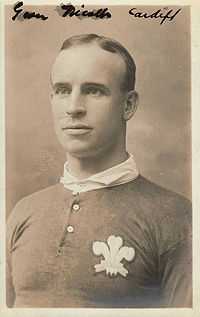
Ten former Welsh internationals have been inducted into the International Rugby Hall of Fame,<ref name=IRHF">"The International Rugby Hall of Fame". The International Rugby Hall of Fame. Archived from the original on 22 June 2013. Retrieved 30 November 2014.</ref> while eight have been inducted into the World Rugby Hall of Fame.[125] One Welsh player, Shane Williams in 2008, has been awarded the World Rugby Player of the Year (formerly known as the IRB Player of the Year).[126]
Somerset-born Frank Hancock, a 2011 inductee into the World Rugby Hall of Fame, changed the game of rugby when he was played as a fourth threequarter for Cardiff.[127] When given the captaincy of Wales in 1886 he trialed the system against Scotland, the very first international match to see four threequarters play. Although the system was abandoned during the match, it was readopted by Wales in 1888 and was quickly absorbed by the other Home Nation countries. It is now the standard formation in world rugby.
Known as the Prince of three-quarters, Gwyn Nicholls played 24 Tests for Wales at centre between 1896 and 1906.[128] He was the only Welsh player in the British Isles team of 1899, and was the star for Wales during their first golden era. Not only did he captain Wales to three Triple Crowns, but also led them to their famous victory over the All Blacks in 1905.[129] On 26 December 1949, gates bearing his name at Cardiff Arms Park were officially opened.[128]
Bleddyn Williams and Jack Matthews, both centres who were inducted into the World Rugby Hall of Fame in 2013, were called by World Rugby "a uniquely complementary and successful partnership at club, national team and Lions levels after the Second World War".[130] Both captained Cardiff and Wales, made their international debuts in 1947, and were on the Lions squad that toured Australia and New Zealand in 1950. Williams, nicknamed the "Prince of Centres", earned 22 caps for Wales and five for the Lions in an eight-year Test career. Wales won all five Tests in which he served as captain; at the time of his induction, he was the only Wales captain with a 100% winning record. Williams went on to become a prominent rugby commentator. Matthews, renowned for his strong tackling, earned 17 caps for Wales and six for the Lions, calling time on his Test career in 1951. After his playing career, he became the Lions' first team doctor, serving in that role during the 1980 tour to South Africa.[130]
Named the greatest Welsh player of the 1950s by the WRU, Cliff Morgan played 29 Tests for Wales,[131] and four for the British Lions between 1951 and 1958.[132] Morgan played at fly-half and was one of the sport's biggest crowd-pullers during his career.[133] He played during Wales' Five Nations Grand Slam of 1952, and their victory over the All Blacks in 1953,[134] but he is most famous for captaining the British Lions in South Africa in 1955.[132] One of Morgan's great friends was Carwyn James.[135] Although most notable for his coaching record, James appeared for Wales in two Tests in 1958. He coached the British Lions to their only series victory over New Zealand in 1971, with a team including many Welsh players.[136] He also coached Welsh club Llanelli, and the Barbarians side that defeated the All Blacks in 1973. Despite this, he never coached Wales.[137] Morgan, inducted into the International Rugby Hall of Fame in 1997,[133] was further honoured with induction into the World Rugby Hall of Fame in 2009.[138]
When Wales faced Australia on 3 December 1966, two future Rugby Hall of Fame members made their Test debuts; Gerald Davies and Barry John.[139] Davies played 46 Tests for Wales between 1966 and 1978. Although he started out playing in the centre, he was moved to the wing during Wales' 1969 tour of New Zealand and Australia,[140] and eventually scored 20 Test tries for Wales. Davies also played for the Lions during their 1968 tour of South Africa and 1971 tour of New Zealand.[141] Barry John first played for Wales in 1966, and was selected for the 1968 Lions' tour of South Africa.[142] Playing at fly-half, John helped Wales to a Five Nations Grand Slam in 1971, and then the Lions to their one and only series win over the All Blacks that same year. His exploits on the Lions tour of 1971 were rewarded with the nickname of The King by the New Zealand press, though the pressure of expectation and fame saw him quit rugby the following year.[143]
Widely regarded as the greatest rugby union player of all time, Gareth Edwards played 53 Tests for Wales at scrum-half between 1967 and 1978.[144][145] Edwards was never dropped from the team and played all 53 of his Tests consecutively. He also played in three Lions tours; including the series victories in New Zealand in 1971, and the unbeaten tour of South Africa in 1974.[146] Edwards won five Triple Crowns with Wales and three Five Nations Grand Slams. He also scored a try for the Barbarians against the All Blacks in 1973, remembered as that try and considered one of the sport's greatest.[147] In 2003, Edwards was voted the greatest player of all time by Rugby World magazine.[148][144] In 2007, Edwards earned an additional honour with his induction into the World Rugby Hall of Fame.[149]
In 1969, three Hall of Fame members debuted for Wales; Phil Bennett, Mervyn Davies, and JPR Williams. Bennett played 29 Tests for Wales. He started out playing at fullback, but after Barry John retired, he was moved to fly-half. As well as representing Wales, he played eight Tests for the Lions and captained them on their 1977 tour of New Zealand.[150] Mervyn Davies was known as Merve the Swerve and played 38 consecutive Tests for Wales between 1969 and 1976, losing only eight of them.[151] After captaining Wales in his last nine appearances, Davies was forced to retire due to a brain haemorrhage.<ref name="MDaviesObit>"Wales legend Mervyn Davies dies after losing fight against cancer". BBC Sport. 16 March 2012. Retrieved 30 November 2014.</ref> JPR Williams played 55 Tests for Wales between 1969 and 1981. Whilst doing so, he won six Triple Crowns, three Five Nations Grand Slams, and captained Wales for five Tests in 1979.[152] Playing at full-back, he also toured with the Lions in 1971 and 1974, before retiring temporarily in 1980. He made a brief comeback, however, in 1981, when he played his final match, against Scotland.[153]
Ieuan Evans played for Wales between 1987 and 1998, and in the process earned 72 Welsh caps whilst Wales was transcending the amateur and professional eras. Playing mainly on the wing, Evans scored 33 tries for Wales, a record until surpassed by Gareth Thomas in 2004.[154] As well as that, he was awarded seven Lions caps from the 1989, 1993 and 1997 tours.[155][156]
In November 2008, Shane Williams and Ryan Jones became the first Welsh players to be nominated in a group of five players for the World Player of the Year award, first awarded in 2001. Shane Williams was duly selected as the 2008 World Rugby Player of the Year.[157]
Individual records
- See List of Wales national rugby union team records; and List of Wales national rugby union players for a sortable list containing player caps and tries
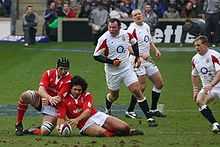
Neil Jenkins was the first rugby player to surpass 1000 Test points. He holds several records for the Wales team, including the most points scored for Wales with 1049, the most successful penalty kicks for Wales with 248, and the Wales record for most points in a single Test match with 30.[158][159] The record for drop-goals for Wales is held by Jonathan Davies with 13.[160]
Shane Williams is Wales' record try-scorer with 58 tries. Williams is also Wales' record try-scorer in Six Nations Championships with 22 and the Rugby World Cups with 10.[161] Colin Charvis' 22 tries is the all-time Welsh record for a forward, and was the world record for tries by a forward until 2011.[162]
Gethin Jenkins is the nation's most capped player with 114 Welsh caps. Three other players have earned 100 caps or more: Stephen Jones with 104, and Gareth Thomas and Martyn Williams with 100.[163] The record for most Tests as captain is held by Sam Warburton with 35.[164] The record for the most consecutive appearances is held by Gareth Edwards who played all 53 of his Tests for Wales consecutively between 1967 and 1978.[158] Edwards is also Wales' youngest ever captain at the age of 20.
The youngest player ever capped for Wales is Tom Prydie, who made his debut in Wales' 2010 Six Nations finale against Italy at age 18 years, 25 days, beating the record set by Norman Biggs in 1888.[165][166] Prydie is also Wales' youngest try-scorer, scored against South Africa in June 2010, overtaking the record that Tom Pearson set on his debut in 1891.[167] Winger George North, aged 18 years 214 days, overtook Pearson's record as the youngest Wales player to score a try on debut in November 2010.[168]
Paul Thorburn holds the world record for the longest successful kick in an international Test match. He gained the record during the 1986 Five Nations Championship at Cardiff Arms Park with a penalty kick measuring exactly 70 yards 8 and a half inches (64.2 metres) against Scotland.
Welsh Sports Hall of Fame
The following Welsh players have been inducted into the Welsh Sports Hall of Fame:
- 1990 Ken Jones
- 1991 Cliff Jones, Cliff Morgan
- 1992 Gerald Davies
- 1994 J.P.R. Williams
- 1997 Bleddyn Williams
- 1998 Gareth Edwards, Lewis Jones
- 1999 Carwyn James, Barry John
- 2000 David Watkins
- 2001 Mervyn Davies
- 2002 Gwyn Nicholls
- 2003 Jonathan Davies, Willie Davies, John Dawes
- 2005 John Gwilliam
- 2007 Arthur Gould, Phil Bennett
- 2008 Billy Trew
- 2009 J.J. Williams
- 2012 Bryn Meredith
- 2013 Clive Rowlands
Coaches
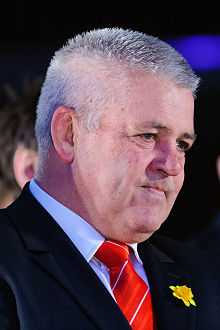
Following the unsuccessful tour to South Africa in 1964, the WRU set up a working party on coaching. The party recommended that Welsh clubs accept the principle of coaching. David Nash was appointed as the national team's first coach in 1967, but for the 1968 tour of Argentina, the WRU initially planned not to have a coach tour with the team. Following pressure from the Welsh clubs at the WRU's annual general meeting, the decision was reversed and Clive Rowlands was appointed as coach for the tour.[36] The appointing of a coach for the team coincided with Wales' success in the Five Nations during the 1970s.[170]
| Name | Nationality | Years | Tests | Won | Drew | Lost | Win % |
|---|---|---|---|---|---|---|---|
| David Nash | |
1967 | 5 | 1 | 1 | 3 | 20 |
| Clive Rowlands | |
1968–74 | 29 | 18 | 4 | 7 | 62 |
| John Dawes | |
1974–79 | 24 | 18 | 0 | 6 | 75 |
| John Lloyd | |
1980–82 | 14 | 6 | 0 | 8 | 43 |
| John Bevan | |
1982–85 | 15 | 7 | 1 | 7 | 47 |
| Tony Gray | |
1985–88 | 18 | 9 | 0 | 9 | 50 |
| John Ryan | |
1988–90 | 9 | 2 | 0 | 7 | 22 |
| Ron Waldron | |
1990–91 | 10 | 2 | 1 | 7 | 20 |
| Alan Davies | |
1991–95 | 35 | 18 | 0 | 17 | 51 |
| Alex Evans | |
1995 (caretaker coach) | 4 | 1 | 0 | 3 | 25 |
| Kevin Bowring | |
1995–98 | 29 | 15 | 0 | 14 | 52 |
| Dennis John | |
1998 (caretaker coach) | 2 | 1 | 0 | 1 | 50 |
| Graham Henry | |
1998–2002 | 34 | 20 | 1 | 13 | 59 |
| Lynn Howells | |
2001 (caretaker coach) | 2 | 2 | 0 | 0 | 100 |
| Steve Hansen | |
2002–04 | 29 | 10 | 0 | 19 | 35 |
| Mike Ruddock | |
2004–06 | 20 | 13 | 0 | 7 | 65 |
| Scott Johnson | |
2006 (caretaker coach) | 3 | 0 | 1 | 2 | 0 |
| Gareth Jenkins[172] | |
2006–07 | 20 | 6 | 1 | 13 | 30 |
| Nigel Davies | |
2007 (caretaker coach) | 1 | 0 | 0 | 1 | 0 |
| Warren Gatland[169] | |
2007–present | 56 | 28 | 1 | 27 | 50 |
| Robin McBryde[173] | |
2009, 2013 (caretaker coach) | 4 | 3 | 0 | 1 | 75 |
| Rob Howley[174] | |
2012–13 (caretaker coach) | 11 | 5 | 0 | 6 | 46 |
See also
Notes
- ↑ Wales was the 28th match of New Zealand's tour, and at that point the tourists had scored 801 points and conceded only 22.[11]
- ↑ Shared with Ireland.[8]
- ↑ Wales defeated France in 1908 and 1909 to win Grand Slams in those seasons also even though France did not join the Championship until 1910.[8]
- ↑ France was readmitted into international rugby union following the Home Nations Championship in 1939; France had been expelled in 1931.[27]
- ↑ In international rugby union, the home team traditionally wears their change strip if there is a colour clash; hence the name change strip rather than away strip.
- ↑ For the Rugby World Cup the jersey is not allowed any sponsors on it – only the national union's emblem, the Rugby World Cup logo, and the logo of the jersey's manufacturer.[84]
- ↑ Ranking archives can be found at the World Rugby website.[111]
References
- ↑ Sheers (2013), p. 1984.
- ↑ "Historical Rugby Milestones 1880s". rugbyfootballhistory.com. Retrieved 10 August 2007.
- ↑ 3.0 3.1 3.2 "History". Six Nations Rugby Ltd. Retrieved 30 November 2014.
- ↑ "RBS 6 Nations Fixtures & Results: 1882–1883". Six Nations Rugby Ltd. Retrieved 1 December 2014.
- ↑ 5.0 5.1 5.2 5.3 "6 Nations History". rugbyfootballhistory.com. Retrieved 12 August 2007.
- ↑ 6.0 6.1 6.2 "Six Nations History". 6-nations-rugby.com. Archived from the original on 17 June 2008. Retrieved 15 June 2008.
- ↑ Andrews (1991), p. 343.
- ↑ 8.0 8.1 8.2 8.3 8.4 8.5 8.6 8.7 8.8 "Six Nations Championship: Past Winners". ESPN. Retrieved 1 December 2014.
- ↑ Elliott (2012), pp. 177–178.
- ↑ Vincent (1998), p. 124.
- ↑ 11.0 11.1 McCarthy (1968), p. 46.
- ↑ "The 1905/06 'Originals'". rugbymuseum.co.nz. Archived from the original on 26 March 2013. Retrieved 12 August 2007.
- ↑ McCarthy (1968), pp. 48–49.
- ↑ "7th All Black Test: 83rd All Black Game". allblacks.com. Retrieved 12 August 2007.
- ↑ Elliott (2012), p. 198.
- ↑ Parry-Jones (1999), p. 180.
- ↑ Davies, Sean (28 September 2006). "Mighty Boks: South African rugby". BBC Sport. Retrieved 12 August 2007.
- ↑ "Rugby Football". The Free Lance (Wellington). 12 January 1907. Retrieved 30 November 2014.
- ↑ 19.0 19.1 Davies, Sean (22 September 2005). "Wallaby wonders: Aussie rugby". BBC Sport. Retrieved 12 August 2007.
- ↑ Smith (1980), p. 198.
- ↑ 21.0 21.1 Smith (1980), p. 204.
- ↑ Richards (2006), p. 123.
- ↑ Richards (2006), p. 124.
- ↑ Richards (2006), p. 126.
- ↑ Smith (1980), p. 262.
- ↑ Richards (2006), p. 135
- ↑ Richards, Huw (24 February 2010). "Wooller inspires British Army triumph". Retrieved 1 December 2014.
- ↑ Richards (2006), p. 46.
- ↑ McLean (1969), p. 147.
- ↑ Potter (1961), p. 99.
- ↑ Smith (1980), p. 344.
- ↑ McCarthy (1968), p. 233.
- ↑ Smith (1980), p. 349.
- ↑ 34.0 34.1 Smith (1980), p. 368.
- ↑ "World Rugby 1951 – Date". rfu.com. Retrieved 31 January 2014.
- ↑ 36.0 36.1 Morgan & Fleming (2003), pp. 44–45.
- ↑ Smith (1980), p. 389.
- ↑ Smith (1980), p. 393.
- ↑ McLean (1969), p. 144.
- ↑ McLean (1969), p. 119.
- ↑ Smith (1980), p. 400.
- ↑ "A Brief History of the Welsh Rugby Union". Welsh Rugby Union. Retrieved 18 September 2007.
- ↑ 43.0 43.1 43.2 "Wales' Grand Slam History". Welsh Rugby Union. 21 March 2005. Archived from the original on 3 July 2007. Retrieved 18 March 2008.
- ↑ "Six Nations: Golden moments". BBC Sport. 24 January 2003. Retrieved 18 September 2007.
- ↑ "1971 Australia & New Zealand". British Lions Ltd. Retrieved 30 November 2014.
- ↑ "Sport in chaos as crisis deepens". BBC Sport. 27 February 2001. Retrieved 20 September 2007.
- ↑ Smith (1980), p. 432.
- ↑ "180th All Black Test: 741st All Black Game". allblacks.com. Retrieved 21 September 2007.
- ↑ Mehaffey, John (24 November 2005). "Mourie has mixed emotions over Haden dive". tiscali.co.uk. Archived from the original on 12 October 2007. Retrieved 21 September 2007.
- ↑ This is victory over England, Ireland, Scotland and Wales all on the same tour.
- ↑ 51.0 51.1 51.2 Davies, Sean (13 November 2004). "All Black magic: New Zealand rugby". BBC Sport. Retrieved 25 September 2007.
- ↑ "191st All Black Test: 792nd All Black Game". allblacks.com. Retrieved 25 September 2007.
- ↑ Davies, Sean (12 February 2007). "Eastern Promise: Japanese rugby". BBC Sport. Retrieved 18 September 2007.
- ↑ Peatey (2011), p. 36.
- ↑ Peatey (2011), p. 39.
- ↑ 56.0 56.1 Peatey (2011), pp. 246–247.
- ↑ 57.0 57.1 Peatey (2011), pp. 264–265.
- ↑ 58.0 58.1 Peatey (2011), pp. 282–283.
- ↑ Glover, Tim (10 January 1999). "Re-enter the Dragon; interview – Kevin Bowring". The Independent. Retrieved 2 December 2014.
- ↑ 60.0 60.1 "Graham Henry". Welsh Rugby Union. Retrieved 1 December 2014.
- ↑ "Henry the "Great Redeemer"". tvnz.co.nz. 6 July 2005. Archived from the original on 15 October 2007. Retrieved 27 September 2007.
- ↑ 62.0 62.1 Peatey (2011), p. 115.
- ↑ 63.0 63.1 Peatey (2011), pp. 323–324.
- ↑ 64.0 64.1 Peatey (2011), p. 160.
- ↑ Palmer, Bryn (21 March 2005). "Wonderful Wales exude joy of Six". BBC Sport. Retrieved 27 September 2007.
- ↑ "All Blacks step up a Gear to crush Wales". Australian Broadcasting Corporation. 6 November 2005. Retrieved 27 September 2007.
- ↑ "Wales Results Archive". Welsh Rugby Union. Archived from the original on 15 October 2007. Retrieved 27 September 2007.
- ↑ "Ruddock steps down as Wales coach". BBC Sport. 14 February 2006.
- ↑ "Wales unveil Jenkins as new coach". BBC Sport. 27 April 2006. Retrieved 27 September 2007.
- ↑ "New trophy for Wales v Australia". BBC Sport. 10 May 2007. Retrieved 27 September 2007.
- ↑ 71.0 71.1 Peatey (2011), pp. 186–187.
- ↑ 72.0 72.1 Peatey (2011), p. 188.
- ↑ "Lewis explains Jenkins' sacking". BBC Sport. 5 October 2007. Retrieved 3 November 2007.
- ↑ "Gatland unveiled as Wales coach". BBC Sport. 8 November 2007. Retrieved 8 November 2007.
- ↑ "Wales prove they're Grand masters". Wales On Sunday. 16 March 2008. Retrieved 2 May 2008.
- ↑ 76.0 76.1 "Wales 8–9 France". BBC Sport. 15 October 2011. Retrieved 4 April 2012.
- ↑ "Wales 16–9 France". Guardian (London). 17 March 2012. Archived from the original on 4 April 2012. Retrieved 4 April 2012.
- ↑ "Wales 16–9 France". BBC Sport. 17 March 2012. Retrieved 4 April 2012.
- ↑ "Wales bask in Six Nations title after slamming England in Cardiff rout". The Guardian. 16 March 2013.
- ↑ Rowland, Paul (19 November 2013). "Wales unveil new 'graphite' away shirt for Tonga international". walesonline.co.uk. Retrieved 4 February 2013.
- ↑ 81.0 81.1 "Wales Out of Red and into Black". Welsh Rugby Union. 11 October 2005. Archived from the original on 21 February 2009. Retrieved 15 June 2008.
- ↑ "Under Armour – Official Technical Partner". Welsh Rugby Union. Retrieved 30 November 2014.
- ↑ Rimmer, Simon (19 November 2013). "Player 'Selfies' Reveal New Change Kit". Welsh Rugby Union. Retrieved 4 February 2013.
- ↑ "NZRU not approached about 2015 World Cup ad". stuff.co.nz. 2 September 2014.
- ↑ Andrews (1991), p. 346.
- ↑ "Welsh rugby union strips talent from England – Cotton Traders.". The Independent (UK). 6 December 1991. p. 32.
- ↑ Andrews (1991), p. 336.
- ↑ Andrews (1991), p. 337.
- ↑ Morgan (2005), p. 434.
- ↑ "Record Profits for WRU Group". Welsh Rugby Union. 29 July 2005. Archived from the original on 5 December 2008. Retrieved 15 June 2008.
- ↑ "Fans celebrate win over Scotland". BBC News. 13 March 2005. Retrieved 25 August 2007.
- ↑ "The rugby might be poor but the profits are good". icwales.co.uk. 5 August 2006. Retrieved 15 June 2008.
- ↑ Griffiths (1987), 4:3.
- ↑ Smith (1980), pp.474–480
- ↑ "Liberty Stadium – The Background". liberty-stadium.com. Retrieved 24 August 2007.
- ↑ Smith (1980), p. 114.
- ↑ Smith (1980), p. 9.
- ↑ Smith (1980), p. 139.
- ↑ Smith (1980), p. 175.
- ↑ Smith (1980), p. 219.
- ↑ Smith (1980), p. 284.
- ↑ Smith (1980), p. 371.
- ↑ Smith (1980), p. 372.
- ↑ Smith (1980), p. 373.
- ↑ Hale, Matt (30 July 2004). "The Venue: The Millennium Stadium". TheFA.com. Archived from the original on 5 April 2005. Retrieved 18 February 2008.
- ↑ "Background to the Millennium Stadium Project". millenniumstadium.com. Archived from the original on 9 October 2007. Retrieved 10 November 2007.
- ↑ "Why is it taking so long?". Bristol Evening Post. 28 May 2007. p. 8.
- ↑ "Championships & Titles". Welsh Rugby Union. Retrieved 30 November 2014.
- ↑ Peatey (2011), pp. 300–301.
- ↑ 110.0 110.1 "World Rankings". World Rugby. Retrieved 23 March 2015.
- ↑ 111.0 111.1 "World Rugby Rankings". World Rugby. Retrieved 30 November 2014.
- ↑ "Statsguru – Test matches". ESPN. Retrieved 28 November 2014.
- ↑ 113.0 113.1 "Wales Stats: Country by Country Breakdown". Welsh Rugby Union. Retrieved 28 November 2014.
- ↑ Wales statistics
- ↑ Wales name 34-man Six Nations squad
- ↑ Wales call up Owens and Francis
- ↑ Francis added to Wales squad
- ↑ Wales captain Sam Warburton signs WRU central contract
- ↑ Wales: Dan Lydiate joins Ospreys on a national dual contract
- ↑ Wales dual contracts for NG Dragons pair and Scarlets prop
- ↑ Jake Ball: Wales and Scarlets second row signs dual contract
- ↑ Wales and Scarlets' prop Samson Lee signs national dual contract
- ↑ Webb signs National Dual Contract
- ↑ 124.0 124.1 124.2 124.3 "Four New National Dual Contracts". wru.co.uk (Welsh Rugby Union). 18 March 2015. Retrieved 18 March 2015.
- ↑ "IRB Hall of Fame welcomes 15 new inductees". World Rugby. 18 November 2014. Retrieved 30 November 2014.
- ↑ "World Rugby Awards Past Winners". World Rugby. 2014. Retrieved 30 November 2014.
- ↑ "Hancock and Cardiff inducted to Hall of Fame" (Press release). International Rugby Board. 6 May 2011. Archived from the original on 29 October 2014. Retrieved 7 May 2011.
- ↑ 128.0 128.1 Williams, Moelwyn. "Nicholls, Erith Gwyn". Welsh Biography Online. Retrieved 20 August 2007.
- ↑ "Gwyn Nicholls". rugbyhalloffame.com. Archived from the original on 8 December 2012. Retrieved 20 August 2007.
- ↑ 130.0 130.1 "Bleddyn and Dr Jack Together Again". Welsh Rugby Union. 24 October 2013. Retrieved 30 November 2014.
- ↑ "Morgan honoured". Welsh Rugby Union. 25 November 2006. Retrieved 31 January 2014.
- ↑ 132.0 132.1 "Cliff Morgan". British Lions Ltd. Retrieved 31 January 2014.
- ↑ 133.0 133.1 "Cliff Morgan". rugbyhalloffame.com. Archived from the original on 10 September 2012. Retrieved 20 August 2007.
- ↑ Turner, Robin (29 August 2013). "Welsh rugby great Cliff Morgan dies at 83". walesonline.co.uk. Retrieved 31 January 2014.
- ↑ Foot, David (22 March 2001). "Lonely prince of coaches". The Guardian (UK). Archived from the original on 11 October 2006. Retrieved 20 August 2007.
- ↑ "Carwyn James". rugbyhalloffame.com. Archived from the original on 8 December 2012. Retrieved 20 August 2007.
- ↑ Hewett, Chris (3 December 2004). "Why has rugby shortchanged the Barbarian legends of '73?". The Independent (UK). Archived from the original on 19 June 2011. Retrieved 15 June 2008.
- ↑ "Wales great Cliff Morgan dies aged 83". ESPN. 29 August 2013. Retrieved 30 November 2014.
- ↑ "Legend Delme Thomas on life, lows, Lions and THAT amazing day". Carmarthen Journal. 26 November 2013. Retrieved 31 January 2014.
- ↑ "Gerald Davies CBE". BBC Sport. 31 December 2002. Retrieved 20 August 2007.
- ↑ "Gerald Davies". rugbyhalloffame.com. Archived from the original on 4 January 2013. Retrieved 20 August 2007.
- ↑ Baines, Huw (October 2008). "Barry John: Wales". ESPN. Retrieved 31 January 2014.
- ↑ "Barry John". rugbyhalloffame.com. Archived from the original on 8 December 2012. Retrieved 20 August 2007.
- ↑ 144.0 144.1 "Gareth Edwards". ESPN. Retrieved 2 February 2013.
- ↑ Keating, Frank (3 April 2007). "This is Gareth Edwards' dramatic finish – what a score". theguardian.co.uk. Retrieved 2 February 2014.
- ↑ Kimmage, Paul (25 March 2007). "Leader of the backs". The Times (UK). Archived from the original on 30 March 2007. Retrieved 21 August 2007.
- ↑ Morgan, Cliff (25 January 2013). "Cliff Morgan salutes 'greatest try' when Gareth Edwards scored for Barbarians against All Blacks in 1973". The Telegraph. Retrieved 2 February 2014.
- ↑ "Rugby legend Edwards handed honor". CNN. 30 December 2006. Retrieved 3 November 2007.
- ↑ "Springbok winger Habana is Player of the Year". The Telegraph. 22 October 2007. Retrieved 30 November 2014.
- ↑ "Phil Bennett". rugbyhalloffame.com. Archived from the original on 29 September 2007. Retrieved 22 August 2007.
- ↑ "Mervyn Davies". rugbyhalloffame.com. Archived from the original on 27 September 2007. Retrieved 22 August 2007.
- ↑ "JPR Williams". 100welshheroes.com. Retrieved 22 August 2007.
- ↑ Collins, Jon. "J.P.R. Williams". sporting-heroes.net. Retrieved 4 February 2014.
- ↑ "Gareth Thomas, Welsh centurion". Welsh Rugby Union. 26 September 2007. Archived from the original on 17 May 2008. Retrieved 15 June 2008.
- ↑ "Ieuan Evans". rugbyhalloffame.com. Archived from the original on 9 September 2012. Retrieved 3 November 2007.
- ↑ "Ieuan Evans". ESPN. Archived from the original on 13 December 2013. Retrieved 2 February 2014.
- ↑ "Williams wins top rugby accolade". BBC Sport. 23 November 2008. Retrieved 9 January 2010.
- ↑ 158.0 158.1 "International Individual Records". superrugby.co.za. 13 August 2007. Archived from the original on 14 May 2008. Retrieved 15 June 2008.
- ↑ "Neil Jenkins". ESPN. Retrieved 4 February 2013.
- ↑ "Statsguru / Test matches / Player records". ESPN. Retrieved 4 February 2014.
- ↑ Richards, Huw (5 June 2012). "The little winger who left a big impression". ESPN. Retrieved 4 February 2013.
- ↑ "Colin Charvis". ESPN. Retrieved 4 February 2013.
- ↑ "Wales Records & Milestones: Welsh Centurions". Welsh Rugby Union. Retrieved 16 March 2014.
- ↑ "Wales Captains: 1881–Present". Welsh Rugby Union. Retrieved 4 February 2013.
- ↑ Sportsbeat (20 March 2010). "Hook crosses twice in Wales romp over Italy". Six Nations Rugby Ltd. Archived from the original on 15 December 2013. Retrieved 22 March 2010.
- ↑ James, Steve (20 March 2010). "Tom Prydie's record-breaking Wales debut made little sense". The Telegraph. Retrieved 4 February 2014.
- ↑ Thomas, Simon (7 June 2010). "Pride as record Wales try for Tom Prydie". walesonline.co.uk. Retrieved 4 February 2010.
- ↑ Richards, Huw (19 November 2010). "A record-breaking debut". ESPN. Retrieved 4 February 2014.
- ↑ 169.0 169.1 "Warren Gatland". Welsh Rugby Union. Retrieved 31 January 2014.
- ↑ Morgan & Fleming (2003), p. 46.
- ↑ "Wales' rugby coaches". BBC Sport. Retrieved 31 January 2014.
- ↑ "Gareth Jenkins". Welsh Rugby Union. Retrieved 31 January 2014.
- ↑ "Robin McBryde". Welsh Rugby Union. Retrieved 31 January 2014.
- ↑ "Rob Howley". Welsh Rugby Union. Retrieved 31 January 2014.
Bibliography
- Andrews, David (1991). "Welsh Indigenous! and British Imperial? – Welsh Rugby, Culture, and Society 1890–1914" (PDF). Journal of Sport History 18 (3): 335–349.
- Dine, Philip (2001). French Rugby Football – Cultural History. Berg. ISBN 1-85973-327-1.
- Elliott, Matt (2012). Dave Gallaher – The Original All Black Captain (paperback). London: Harper Collins. ISBN 978-1-86950-968-2.
- Griffiths, John (1987). The Phoenix Book of International Rugby Records. London: Phoenix House. ISBN 0-460-07003-7.
- Harris, John (2007). "Cool Cymru, rugby union and an imagined community". International Journal of Sociology and Social Policy 27 (3/4): 151–162. doi:10.1108/01443330710741084.
- Morgan, Leighton; Fleming, Scott (2003). "The Development of Coaching in Welsh Rugby Union Football" (PDF). Football Studies 6 (2): 39–51.
- McCarthy, Winston (1968). Haka! The All Blacks Story. London: Pelham Books.
- McLean, Terry (1969). Red Dragons of Welsh Rugby. Wellington: A. H. & A. W. REED. ISBN 0-589-00395-X.
- Morgan, Gareth (May 2005). "Rugby and Revivalism: Sport and Religion in Edwardian Wales". The International Journal of the History of Sport 22 (3): 434–456. doi:10.1080/09523360500064057.
- Palenski, Ron (2003). Century in Black – 100 Years of All Black Test Rugby. Hodder Moa Beckett Publishers Limited. ISBN 1-86958-937-8.
- Parry-Jones, David (1999). Prince Gwyn, Gwyn Nicholls and the First Golden Era of Welsh Rugby. Bridgend: seren. ISBN 1-85411-262-7.
- Peatey, Lance (2011). In Pursuit of Bill: A Complete History of the Rugby World Cup. New Holland Publishers. ISBN 9781742571911.
- Potter, Alex; Duthen, Georges (1961). The Rise of French Rugby. Wellington: A. H. & A. W. REED.
- Richards, Huw (2006). A Game for Hooligans. Mainstream Publishing. ISBN 1-84596-016-5.
- Ryan, Greg (2005). The Contest for Rugby Supremacy – Accounting for the 1905 All Blacks. Canterbury University Press. ISBN 1-877257-36-2.
- Sheers, Owen (2013). Calon: A Journey to the Heart of Welsh Rugby. Faber & Faber. ISBN 9780571297313.
- Smith, David; Williams, Gareth (1980). Fields of Praise: The Official History of The Welsh Rugby Union. Cardiff: University of Wales Press. ISBN 0-7083-0766-3.
- Vincent, V. T. (1998). "Practical Imperialism: The Anglo‐Welsh Rugby Tour of New Zealand, 1908". The International Journal of the History of Sport (Routledge) 15 (1): 123–140. doi:10.1080/09523369808714015.
External links
| Wikimedia Commons has media related to Wales national rugby union team. |
| Awards | ||
|---|---|---|
| Preceded by |
BBC Wales Sports Personality of the Year 1971 |
Succeeded by |
| ||||||||||||||||||||||||||||||||||||||
| ||||||||||||||||||||||||||||||||||||
| ||||||||||||||||||||||||||||||||||||||||||
| ||||||||||||||
| ||||||||||||||||||||||||||||||||||||||||
| ||||||||||||||||||||||||||||||||||||||||||||||||||||